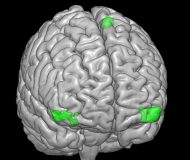

Breastfeeding has been associated with various health benefits for infants, such as improved immunity and reduced risk of chronic diseases. However, few studies have explored its relationship with children’s brain development.
A study led by Christian Stephan-Otto, scientific coordinator of the Pediatric Imaging Computing Center (PeCIC) at Sant Joan de Déu Hospital – Sant Joan de Déu Research Institute, and Maria Portella, head of the Mental Health Research Group at Sant Pau Biomedical Research Institute, analyzed magnetic resonance imaging (MRI) scans of nearly 8,000 children aged 9 to 11 to evaluate the relationship between the duration of breastfeeding and gray matter volume in the brain.
“We observed that the duration of breastfeeding was proportionally associated with greater volume in a specific area of the brain in 9- to 11-year-old children. This region encompasses the inferior frontal gyrus and the lateral orbitofrontal cortex,” comments Stephan Otto, PeCIC coordinator. “Furthermore, these larger volumes were associated with lower levels of impulsivity in these children.”
“These findings suggest that breastfeeding may have long-term effects on brain development and personality,” adds Christian Núñez, first author of the article and researcher at Sant Pau Biomedical Research Institute. “It is important to highlight that these brain regions play a crucial role in decision-making and emotion regulation, among other functions.”
Gray matter is the substance in the brain that primarily contains neuronal cell bodies, dendrites, and synapses, and is responsible for processing sensory information, controlling muscle movements, and conscious thinking. Greater gray matter volume may be associated with better cognitive performance and improved ability to process sensory information.
Additionally, some studies have found that greater gray matter volume is associated with better mental health and a lower risk of developing neuropsychiatric disorders such as depression and anxiety. However, it is important to note that the relationship between gray matter size and brain function is not fully understood and remains the subject of ongoing research.
The inferior frontal gyrus and lateral orbitofrontal cortex are two important regions in the frontal part of the brain that play crucial roles in semantic processing, decision-making, and emotional regulation. While previous research has already shown the clinical and cognitive benefits of breastfeeding, this study has allowed us to observe its effects at the brain level. Furthermore, for the first time, it has been found that the greater volume of gray matter in this region directly impacts children’s levels of impulsivity, indicating that breastfeeding could be essential in personality development.
“These results are just the beginning,” comments Maria Portella, co-coordinator of the study. “We hope to continue investigating how breastfeeding affects the brain and how we can use this information to improve children’s health. With this project, we have laid the foundation for demonstrating the existence of a relationship, and now we need to better understand how this increase in gray matter volume relates to the cognitive and clinical benefits we already know breastfeeding has.”
The study was conducted by a research team from Sant Joan de Déu Barcelona Hospital – Sant Joan de Déu Research Institute, Sant Pau Biomedical Research Institute, Hospital Clínic/IDIBAPS, NeNe Foundation, Autonomous University of Barcelona, and the Biomedical Research Network Centre for Mental Health (CIBER). The project utilizes data from the Adolescent Brain Cognitive Development (ABCD) dataset, a large-scale longitudinal study funded by the National Institute of Health in the United States.
Núñez C, García-Alix A, Arca G, Agut T, Carreras N, Portella MJ, Stephan-Otto C. Breastfeeding duration is associated with larger cortical gray matter volumes in children from the ABCD study. J Child Psychol Psychiatry. 2023 Mar 22. doi: 10.1111/jcpp.13790. Epub ahead of print. PMID: 36946606.